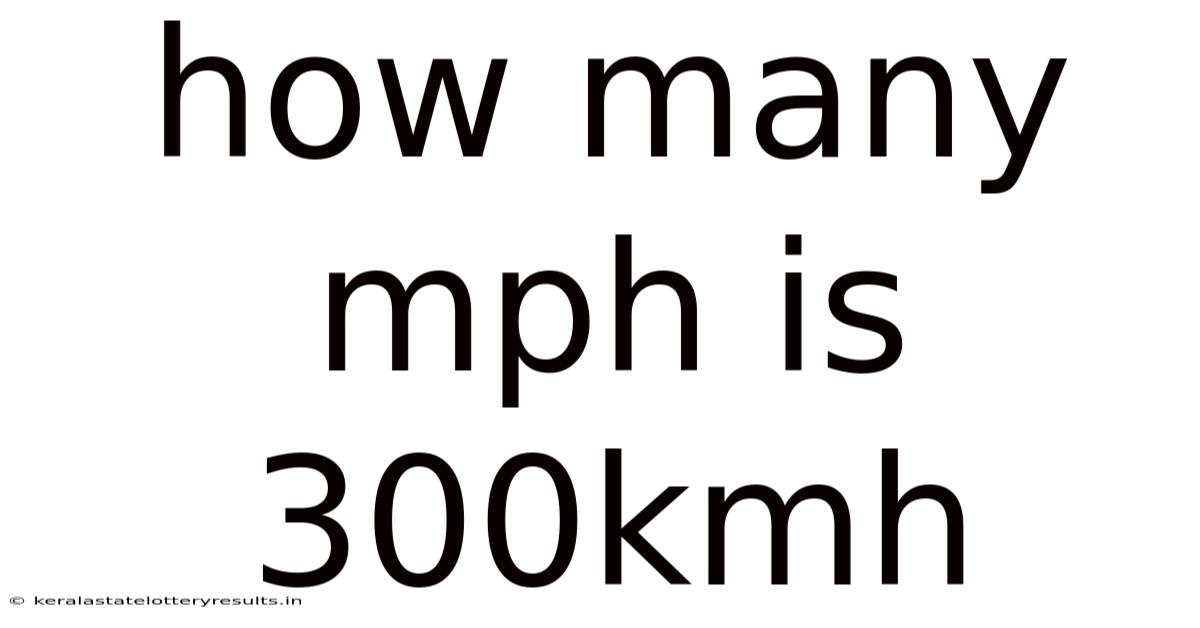How Many Mph Is 300kmh
keralas
Sep 17, 2025 · 5 min read

Table of Contents
How Many MPH is 300 km/h? A Deep Dive into Speed Conversions and Their Applications
Knowing how to convert between kilometers per hour (km/h) and miles per hour (mph) is a crucial skill, especially in today's increasingly interconnected world. This article will not only answer the question "How many mph is 300 km/h?" but also delve into the underlying mathematics, practical applications, and the importance of accurate speed conversions in various fields. We'll explore the conversion process, address common misconceptions, and even touch upon the historical context of these units of measurement.
Understanding the Units: km/h vs. mph
Before we jump into the conversion, let's briefly understand the units involved. Kilometers per hour (km/h) is a metric unit of speed, commonly used in most of the world. It represents the distance traveled in kilometers within one hour. Miles per hour (mph), on the other hand, is an imperial unit of speed predominantly used in the United States and a few other countries. It represents the distance traveled in miles within one hour. The difference lies in the fundamental units of distance: kilometers and miles. One kilometer is approximately 0.621371 miles. This difference is the key to understanding the conversion.
The Conversion: 300 km/h to mph
To convert 300 km/h to mph, we need to multiply the speed in km/h by the conversion factor: 0.621371.
300 km/h * 0.621371 miles/km ≈ 186.41 mph
Therefore, 300 km/h is approximately 186.41 mph.
Detailed Mathematical Explanation
The conversion relies on the fundamental relationship between kilometers and miles. As mentioned earlier, 1 kilometer is equal to approximately 0.621371 miles. This conversion factor is derived from the definition of these units within their respective systems of measurement. The calculation can be represented as follows:
Speed in mph = Speed in km/h * (miles/kilometer)
Speed in mph = 300 km/h * 0.621371 miles/km
Speed in mph ≈ 186.41 mph
This simple equation allows for the accurate conversion of any speed from km/h to mph. Simply substitute the speed in km/h into the equation, and you will obtain the equivalent speed in mph.
Practical Applications of Speed Conversions
Accurate speed conversion is essential in various fields:
- International Travel: When traveling internationally, understanding speed limits and speedometer readings requires accurate conversions. A sign indicating a speed limit of 100 km/h needs to be understood in mph for drivers accustomed to the imperial system.
- Automotive Engineering: Car manufacturers often provide specifications in both km/h and mph to cater to a global audience. Engineering calculations related to speed, acceleration, and braking also rely on accurate conversions.
- Aviation: In aviation, speeds are often measured in knots (nautical miles per hour), requiring conversions to km/h or mph depending on the context. Air traffic control and navigation systems need to handle these conversions seamlessly.
- Meteorology: Wind speeds, crucial for weather forecasting and aviation safety, are often reported in both km/h and mph, necessitating accurate conversion for cross-referencing data.
- Sports: In motorsports and other speed-related sports, accurate conversions are essential for comparing performances across different countries and regions using varying units.
Beyond the Simple Conversion: Addressing Common Misconceptions
While the conversion itself is straightforward, some common misconceptions need clarification:
- Rounding Errors: The conversion factor 0.621371 is an approximation. Using more decimal places will improve accuracy but is usually unnecessary for most practical applications. Rounding to a suitable number of decimal places is acceptable and depends on the required level of precision.
- Inverse Conversion: Converting from mph to km/h requires the inverse of the conversion factor: 1 mile ≈ 1.60934 kilometers. Therefore, to convert 186.41 mph back to km/h, you would multiply by 1.60934.
- Dimensional Analysis: Always ensure you are correctly using the conversion factor. The units must cancel out appropriately to leave you with the desired units (mph in this case).
Historical Context of Units and Conversions
The difference in units stems from different historical developments in measurement systems. The metric system (using kilometers) emerged from a desire for a more standardized and logical system, while the imperial system (using miles) evolved organically over time. This historical divergence is a significant reason why conversions are necessary when dealing with speed and distance.
Frequently Asked Questions (FAQs)
- Q: Is it safe to rely on online converters for speed conversions? A: Generally, yes, but always double-check your results, especially when high precision is required.
- Q: Why are there different approximations for the conversion factor? A: Different levels of precision lead to slightly different approximations. For most practical purposes, using 0.621 or 1.609 is sufficient.
- Q: Are there any other units of speed besides km/h and mph? A: Yes, many other units exist, including knots (nautical miles per hour), feet per second (fps), and meters per second (m/s). Each requires its own specific conversion factor.
Conclusion: Mastering Speed Conversions
Understanding how to convert between km/h and mph is a valuable skill with broad applications. This article has provided a comprehensive guide to the conversion process, explained the underlying mathematics, explored practical applications, and addressed common misconceptions. The next time you encounter a speed expressed in km/h or mph, you'll be equipped with the knowledge to easily and accurately convert it to the desired unit. Remember that precision is important depending on the context, but even a basic understanding of the conversion principle will greatly enhance your ability to interpret and utilize speed information in various situations. Mastering this seemingly simple conversion opens doors to a deeper understanding of global standards, engineering principles, and the diverse world of measurements.
Latest Posts
Related Post
Thank you for visiting our website which covers about How Many Mph Is 300kmh . We hope the information provided has been useful to you. Feel free to contact us if you have any questions or need further assistance. See you next time and don't miss to bookmark.